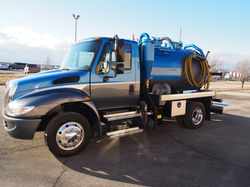The Road Less Traveled: A Comprehensive Guide to Buying Volvo Trucks for Sale by Owner

The Road Less Traveled: A Comprehensive Guide to Buying Volvo Trucks for Sale by Owner
The open road calls, and for many in the trucking industry, the answer lies in the formidable power and renowned reliability of a Volvo truck. Known for their cutting-edge safety features, exceptional driver comfort, and fuel-efficient powertrains, Volvo trucks are a premium choice for owner-operators and fleet managers alike. While dealerships offer new and certified pre-owned options, a significant and often overlooked avenue for acquiring these workhorses is through private sales – directly from the owner.
Buying a Volvo truck for sale by owner can unlock significant value, offering potential cost savings and direct access to a truck’s complete history. However, it also comes with its own set of considerations and risks that demand thorough due diligence. This comprehensive guide will navigate the landscape of owner-sold Volvo trucks, equipping you with the knowledge to make an informed and successful purchase.
The Allure of Volvo: Why Choose a Swedish Workhorse?
Before diving into the "by owner" specifics, it’s crucial to understand what makes Volvo trucks so highly sought after. Their reputation isn’t merely marketing hype; it’s built on decades of innovation and a commitment to core principles:
- Safety First: Volvo has long been a pioneer in truck safety. Features like Volvo Active Driver Assist, Lane Departure Warning, Blind Spot Detection, and advanced braking systems (VEB – Volvo Engine Brake) are designed not just to protect the driver but also to prevent accidents. This translates to lower insurance premiums and, more importantly, peace of mind.
- Driver Comfort & Ergonomics: Long hours on the road demand a comfortable and functional environment. Volvo cabs are renowned for their spaciousness, ergonomic design, premium seating, and intuitive controls. Features like Volvo Dynamic Steering (VDS) reduce driver fatigue significantly, making long hauls less taxing.
- Fuel Efficiency: With rising fuel costs, efficiency is paramount. Volvo’s D-series engines, particularly the D13, are engineered for optimal fuel economy without compromising power. Coupled with the revolutionary I-Shift automated manual transmission, which intelligently selects the right gear, Volvo trucks consistently deliver competitive MPG figures.
- Durability & Reliability: Volvo trucks are built to last. Their robust chassis, heavy-duty components, and meticulous engineering ensure a long service life, even under demanding conditions. This inherent durability contributes to strong resale values.
- Technological Innovation: From the aforementioned I-Shift transmission, which revolutionized heavy-duty trucking, to advanced telematics and connectivity solutions, Volvo continually integrates cutting-edge technology to enhance performance, diagnostics, and operational efficiency.
These attributes make a Volvo truck a sound investment, whether new or used. The challenge, then, lies in finding the right one and ensuring its condition matches its pedigree when buying from a private seller.
The "By Owner" Advantage: Unlocking Value
Opting for a private sale over a dealership often boils down to a few compelling benefits:
- Cost Savings: The most significant advantage is the potential for a lower purchase price. Private sellers don’t have the overhead of a dealership (sales commissions, lot maintenance, advertising), allowing them to offer more competitive prices. You bypass the dealer markup, which can be substantial on a high-value asset like a heavy-duty truck.
- Direct Negotiation: You’re dealing directly with the individual who owns the truck and knows its history best. This direct line of communication can lead to more flexible negotiation terms and a personalized buying experience.
- Transparency and History: A motivated private seller is often more willing to share detailed maintenance records, repair histories, and personal anecdotes about the truck’s operational life. This transparency can provide invaluable insights that a dealership might not readily have or disclose. You might learn about specific quirks, preferred maintenance routines, or even the type of freight the truck primarily hauled.
- Unique Finds: Private sales can sometimes unearth unique or highly customized trucks that might not pass through traditional dealership channels. Owner-operators often invest heavily in customizing their rigs for comfort, efficiency, or specific applications.
Navigating the Landscape: Where to Find Owner-Sold Volvos
The digital age has made finding owner-sold trucks easier than ever. Here are the primary hunting grounds:
- Online Marketplaces (Specialized):
- TruckPaper.com: A behemoth in the commercial truck sales industry, with extensive listings from both dealers and private sellers. You can filter by make, model, year, and even specific features.
- CommercialTruckTrader.com: Similar to TruckPaper, offering a vast inventory of commercial vehicles, including many owner-listed Volvo trucks.
- MyLittleSalesman.com: Another reputable platform for heavy equipment and truck sales.
- General Classifieds & Auction Sites:
- eBay Motors: While often associated with cars, eBay Motors has a robust section for commercial trucks, sometimes featuring private listings.
- Facebook Marketplace & Dedicated Facebook Groups: Numerous Facebook groups cater specifically to truck sales (e.g., "Semi Trucks for Sale," "Owner Operator Trucks"). These can be goldmines for direct-from-owner listings, but require extra vigilance due to the less formal nature of the platform.
- Industry Forums & Communities: Websites like TheTruckersReport.com or trucking-specific forums often have classified sections where owner-operators list their equipment. These communities can also provide valuable advice and insights into specific models or common issues.
- Word-of-Mouth & Local Networking: Don’t underestimate the power of your local trucking community. Check bulletin boards at truck stops, visit independent repair shops, or simply spread the word among fellow truckers that you’re in the market for a Volvo. Many excellent deals happen offline.
The Due Diligence Checklist: What to Look For (and Listen For)
This is the most critical phase of buying a Volvo by owner. Without the backing of a dealership warranty or certification, the onus is entirely on you to ensure the truck is mechanically sound and legally clean.
1. Initial Screening & Communication:
- Detailed Photos & Description: Scrutinize the listing. Are there high-resolution photos from multiple angles (interior, exterior, engine bay)? Is the description thorough, detailing mileage, engine type, transmission, maintenance history, and any known issues?
- Ask Probing Questions: Before even seeing the truck, contact the seller. Inquire about:
- Reason for selling.
- Primary application (long haul, regional, heavy haul, etc.).
- Maintenance schedule and who performed it (dealer, independent shop, owner).
- Major repairs or accidents.
- Any current mechanical issues, warning lights, or "quirks."
- Fuel efficiency expectations.
- Availability of maintenance records.
2. The Paperwork Trail:
- VIN Check: Get the Vehicle Identification Number (VIN) immediately. Run a comprehensive VIN check through services like Carfax, RigDig, or a specialized commercial vehicle history report service. This will reveal accident history, title issues (salvage, flood, rebuilt), lien holders, odometer discrepancies, and previous ownership.
- Title & Registration: Verify the seller is the legal owner and that the title is clean and clear of any liens. Ensure the VIN on the title matches the truck.
- Maintenance Records: This is paramount. A meticulously kept service history indicates a responsible owner and provides a timeline of the truck’s health. Look for records of oil changes, filter replacements, tire rotations, major component overhauls (engine, transmission, differentials), and emissions system maintenance (DPF, DEF).
3. The Physical Inspection (Your Own Eyes & Ears):
- Exterior Walk-Around:
- Frame Rails: Look for rust, cracks, bends, or evidence of welding (especially near stress points). The frame is the backbone.
- Tires: Check tread depth, uneven wear patterns (indicating alignment issues), and sidewall condition. Note the brand and age.
- Body & Paint: Inspect for significant dents, rust, mismatched paint (suggesting bodywork or accidents), and proper alignment of panels.
- Lights & Wiring: Test all exterior lights (headlights, tail lights, markers, turn signals) and look for frayed or exposed wiring.
- Leaks: Look under the truck for any fresh or old fluid leaks (oil, coolant, fuel, hydraulic fluid, air). Check around the engine, transmission, differentials, and fifth wheel.
- Fifth Wheel: Inspect for excessive wear, cracks, proper lubrication, and secure mounting.
- Suspension: Look for cracked springs, worn bushings, leaking air bags (if air suspension), and damaged shocks.
- Brakes: Check for worn brake drums/rotors, thin pads, and proper function of air lines and chambers.
- Engine Bay Inspection:
- Fluids: Check oil, coolant, power steering, and brake fluid levels and condition. Look for milky oil (head gasket issue) or contaminated coolant.
- Belts & Hoses: Inspect for cracks, fraying, or bulging.
- Battery: Check terminals for corrosion and ensure batteries are securely mounted.
- Exhaust System: Look for cracks, excessive rust, or modifications. Pay attention to the DPF (Diesel Particulate Filter) and SCR (Selective Catalytic Reduction) systems – these are costly to repair/replace.
- General Cleanliness: A clean engine bay can indicate a well-maintained truck, though a recently detailed one might hide issues.
- Interior & Cab:
- Dash & Gauges: Start the truck. Do all warning lights illuminate and then extinguish as they should? Are all gauges functioning correctly? Look for signs of tampering.
- Electronics: Test all switches, lights, HVAC, radio, and any integrated telematics.
- Driver’s Seat: Check for excessive wear, tears, and proper adjustment.
- Sleeper: Inspect the mattress, storage areas, and any auxiliary power units (APU) if equipped. Look for signs of water damage or mold.
- Steering Wheel: Check for excessive play, which could indicate steering component wear.
- Pedals: Look for excessive wear.
4. The Test Drive:
- Cold Start: Ideally, be present for a cold start. Listen for abnormal noises, excessive smoke (blue for oil, white for coolant, black for fuel/air issues), or difficulty starting.
- Engine Performance:
- Acceleration: Does the truck accelerate smoothly and powerfully?
- Noise: Listen for unusual engine noises (knocks, ticks, whistles, grinding) at different RPMs.
- Turbocharger: Listen for excessive whining or whistling.
- Transmission (Especially I-Shift):
- Engagement: Does it engage gears smoothly?
- Shifting: Does the I-Shift shift seamlessly and without hesitation or clunking? Test it through all gears, both upshifting and downshifting. Any jerking or delayed shifts can indicate major problems.
- Clutch (if manual): If it’s a manual, check the clutch engagement point and for any slipping.
- Braking: Test both the service brakes and the engine brake (VEB). Does the truck stop smoothly and in a straight line? Are there any squeals or grinding noises?
- Steering: Does the truck track straight? Is there excessive play in the steering wheel? Does Volvo Dynamic Steering (VDS) function as expected, providing light steering at low speeds and firmer control at highway speeds?
- Suspension: Does the truck ride smoothly? Listen for clunks or creaks over bumps.
- Cruising: At highway speeds, listen for excessive wind noise, driveline vibrations, or differential hum.
- Diagnostics: Look for any check engine lights, ABS lights, or other fault codes that appear during the test drive.
5. The Professional Inspection:
This is non-negotiable for any significant private truck purchase. Hire an independent, certified heavy-duty truck mechanic specializing in Volvos. They have the diagnostic tools, specialized knowledge, and experience to identify issues you might miss. This includes:
- Computer Diagnostics: Connecting to the truck’s ECM (Engine Control Module) to pull fault codes (both active and inactive), check engine parameters, fuel consumption data, and emissions system status.
- Comprehensive Mechanical Check: A detailed inspection of the engine, transmission, differentials, suspension, brakes, steering, and electrical systems.
- Fluid Analysis: Taking samples of engine oil, transmission fluid, and coolant for laboratory analysis can reveal internal wear, contamination, and impending failures.
The cost of a professional inspection is a small investment compared to the potential thousands you could lose on a lemon. If the seller refuses a third-party inspection, walk away.
The Art of Negotiation: Getting the Right Price
Once you’re satisfied with the truck’s condition, it’s time to talk numbers.
- Research Market Value: Before making an offer, research comparable Volvo trucks (same model, year, mileage, and condition) sold recently. Use the online marketplaces mentioned earlier as a guide.
- Factor in Known Issues: If the professional inspection or your own due diligence revealed minor issues, factor the cost of those repairs into your offer. Present these findings professionally to the seller.
- Be Prepared to Walk Away: This is your strongest negotiation tool. If the seller is unwilling to budge on an unreasonable price or disclose critical information, be prepared to move on.
- Don’t Rush: A truck purchase is a major financial decision. Take your time, ask questions, and don’t feel pressured into a quick deal.
Financing and Legalities: Securing Your Investment
Once a price is agreed upon, the final steps involve financing and ensuring a legally sound transaction.
- Financing:
- Cash: If you have the capital, paying cash avoids interest payments and simplifies the transaction.
- Bank Loan/Credit Union: Many financial institutions offer commercial truck loans. Get pre-approved before you start shopping to know your budget.
- Specialized Truck Lenders: There are companies that specialize in financing heavy-duty trucks, often with more flexible terms for owner-operators.
- Seller Financing: Rarely, a seller might offer financing, but this is uncommon and requires a very robust legal agreement.
- Bill of Sale: A legally binding document detailing the transaction. It should include:
- Buyer and seller names and contact information.
- Truck details (make, model, year, VIN, mileage).
- Purchase price.
- Date of sale.
- Statement of "as-is" condition (common in private sales).
- Signatures of both parties.
- Title Transfer: This is crucial for establishing your ownership. The seller must sign over the title to you. Depending on your state’s DMV regulations, you may need to complete specific forms and pay transfer fees.
- Lien Check: Before payment, double-check that there are no outstanding liens on the title. A VIN check service should confirm this, but a direct call to the DMV or a local title service can provide additional assurance.
- Insurance: Secure commercial truck insurance before taking possession of the vehicle. You’ll need liability, physical damage, and potentially cargo insurance depending on your operation.
Post-Purchase Considerations: Setting Up for Success
Congratulations, you’re now the proud owner of a Volvo truck! Your journey doesn’t end here.
- Immediate Maintenance: Even if the truck passed inspection, consider performing essential maintenance upon purchase:
- Oil and filter change.
- Fuel filter replacement.
- Greasing all zerk fittings.
- Full fluid check and top-off.
- Tire pressure check and adjustment.
- Familiarization: Spend time understanding your truck. Read the owner’s manual, familiarize yourself with all controls, and learn about its specific features.
- Build a Support Network: Identify reliable Volvo service centers or independent mechanics in your operating area. Connect with other Volvo owner-operators for advice and shared experiences.
Conclusion
Buying a Volvo truck for sale by owner can be an incredibly rewarding experience, offering the chance to acquire a premium piece of machinery at a potentially significant discount. The powerful combination of Volvo’s legendary safety, comfort, and efficiency, paired with the cost-saving potential of a private sale, makes for an attractive proposition.
However, success hinges entirely on your commitment to thorough research, meticulous inspection, and savvy negotiation. By leveraging online resources, asking the right questions, insisting on a professional inspection, and understanding the legalities, you can confidently navigate the private market and drive away with a Volvo that will serve you reliably for years to come. The road less traveled might just lead to your next great investment.



